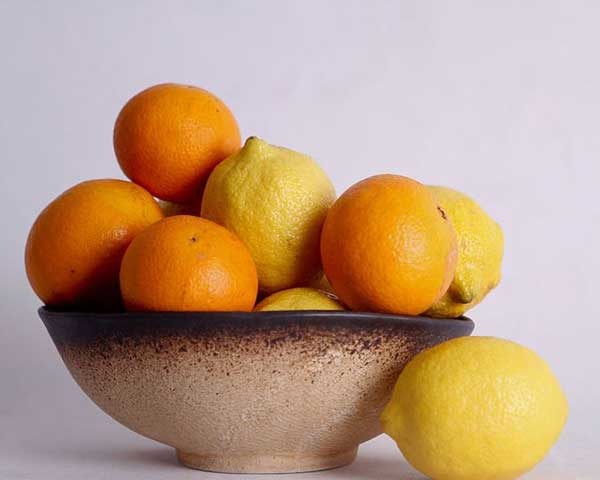The Food Almanac: Monday, March 31, 2014
Today's Flavor
Today is Oranges and Lemons Day. I've already had three big Louisiana navel oranges this morning for their matchless juice. Citrus fruits offer much more than just a drink. Lemon juice is one of the most useful ingredients in the kitchen. Not only does it have a marvelous fresh flavor, but its high acidity–it's one of the most acidic foods we eat–performs all sorts of magic in sauces, as meat marinades, and in keeping things fresh.
Orange juice is less versatile, but much underrated as an ingredient. I'm always trying to include it in baking (as in our orange cheesecake) and in saucemaking (orange hollandaise). Orange zest and skin adds the unique flavor of orange oil.
Although we had three good months of them this year, the season for Louisiana navel oranges is about over the for year. However, we hear that you can go down to Plaquemines Parish groves and ask if you can pick the remaining fruit on the trees. They will be like no other oranges you ever ate, but too delicate to market. They are the best oranges in the world.
The Old Kitchen Sage Sez:
If you jab a wedge of lemon and wipe its juice all over whatever poultry or fish you're cooking, your chances of improving the dish are nearly a hundred percent.
Gourmet Gazetteer
Orange, population 4123, is seventy-four miles northwest of Richmond, Virginia. It's the county seat of Orange County, and has been since 1749. It's full of historic homes, surrounded by orchards and vineyards, and is near a number of Civil War battlefields. The Norfolk Southern Railroad runs through town, carrying on its iron the Amtrak Crescent, the passenger train from New York to New Orleans. The classiest place to dine in the area is the Inn At Meander Plantation, seven miles north of town.
Edible Dictionary
kumquat, n.–A small, orange citrus fruit, usually eaten whole, including the peel. The typical kumquat is oval in shape, about an inch wide and an inch and a half long. Some varieties are round, however. They all seem to come from Southeast Asia. Records of their cultivation go back to the 1100s, and they've been popular throughout the Far East for at least seven hundred years. They grow on bushes that resemble other citrus trees in the shape of their leaves and flowers. They are less sensitive to freezing than almost any other citrus, surviving temperatures of 15 degrees. The skin is sweeter and the pulp more bitter than most citrus. The oils are particularly fragrant, so they're good in cocktails. Other than eating them whole, kumquats can also be preserved. It's a friendly little fruit that lacks a large fan club.
Dining Around The World
In 1889 on this date, the Eiffel Tower was dedicated. Alexandre Gustave Eiffel let the French flag fly from the tower's summit in the ceremony. It opened to the public about a month later, as the entrance to a world's fair. The tower had a restaurant at the lower platform level until the 1980s, when it was disassembled, packed into containers, and shipped to New Orleans. A new structure was built for it at the corner of Josephine and St. Charles Avenue, where Restaurant de la Tour Eiffel opened in 1985. It did not do well, and closed after just three years. It's been several other restaurants since, including the current occupant, Eiffel Society.
Annals Of Sashimi
On this day in 1989, the Food and Drug Administration allowed sushi chefs in New York City to import fugu for the first time. Fugu is the pufferfish whose salient culinary characteristic is that its liver and some other organs are so deadly that eating then can paralyze or kill you. However, the rest of it is alleged to be the best sashimi there is. I've tried it and can tell you this is not true. The ultimate fugu experience is supposed to be eating parts of the fish close to the liver, feeling the anesthesia begin to set in, and then to feel it leave your body. Not for everyone.
Deft Dining Rule #167:
The practice of wrapping lemon halves in yellow gauze–to keep the seeds in when you squeeze the lemon over your fish–is one of those disappearing niceties of fancy restaurants that really made sense. But ipso facto it's not a sign of excellence.
Philosophy Of Taste
Today is the birthday in 1596 of Rene Descartes, a revolutionary figure in both mathematics and philosophy. His most famous utterance gives rise to a good restaurant joke, one that not everybody gets right away:
Seems that Descartes dined in an elegant Paris restaurant one night. He enjoyed a large, excellent repast. The waiter offered him a dessert on the house. Descartes paused a moment, then said, "I think not." Instantly, he disappeared.
Food Namesakes
Author Mary Chestnut was born today in 1823. . . John D. Loudermilk, pop musician and composer, was born today in 1934. He wrote "A Rose And A Baby Ruth" and "Then You Can Tell Me Goodbye," among many other tunes. . . Sir Benjamin Baker, who built the steel bridge over the Firth of Forth, was born today in 1840. He also built the first tunnel under the Hudson River in New York.
Words To Eat By
"And every day when I've been good,
I get an orange after food."–Robert Louis Stevenson.
Words To Drink By
"He uses statistics as a drunken man uses lampposts—for support rather than for illumination."–Andrew Lang, Scottish writer, born today in 1844.
